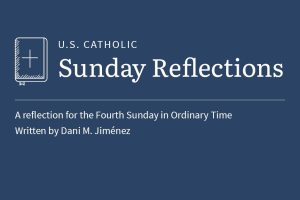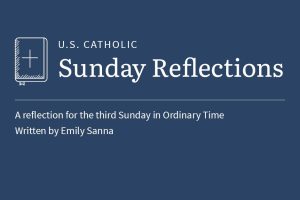Readings (Year B):
Numbers 11:25–29
Psalm 19:8, 10, 12–14
James 5:1–6
Mark 9:38–43, 45, 47–48
Reflection: A God who is unbound
Our first reading today comes from the book of the Bible oddly named “Numbers.” So let’s start with a number problem: Let’s say you are a teacher whose been able to snag tickets for your class to take a coveted backside tour of the zoo, but the tour is limited to 25 students . . . and you have 26. What to do? Or let’s say you are an entrepreneur who owns five stores and you are ready to hand over the business. You’d like to give one store to each of your offspring, but you have six. What to do?
This is the kind of problem Moses seems to have faced in our first reading. He was exhausted by the leadership of the people and asked God for help. God told Moses to take 70 elders from among the twelve tribes of Israel and gather them at the meeting tent. God would share the spirit of prophecy that animated Moses with these elders, so that the ministry of leadership might be distributed more widely. But here’s the rub: 70 cannot be equally divided by twelve. You could have each tribe submit six names, but that’d be 72. To get to 70, two tribes would need to be shorted one elder. Given the constant jostling and complaining of the people, Moses knew that was not going to go over well. “So unfair!” they’d cry. What to do?
The Bible doesn’t actually say all this. It doesn’t lay out the whole numbers problem. But our Jewish brothers and sisters, in their generations of commentary on this text, see it as the most likely backdrop to the story of Eldad and Medad. How else to explain two men whose names, scripture says, were “on the list” but not present with the 70 when the spirit descended? Jewish midrash offers a couple of possibilities for how they came to be left out of the gathering. Possibly Moses held a lottery among the 72 and all drew a stone, with two of the stones marked, “Not you.” Possibly Eldad and Medad were very humble or committed peace makers and bowed out of the running on their own. We don’t know.
But what we do know is that the same God who gave the direction to gather 70 elders in the first place does not in any way seem to be bound by that number. Not because God, I think, necessarily shares our constant concern about fairness. But because it is the nature of God to be free and generous, overflowing even the boundaries God has created. The story of Eldad and Medad reminds me of one of my favorite lines in the Catechism. And since we are talking about numbers today, I’ll let you know it is #1257: “God has bound salvation to the sacrament of Baptism, but he himself is not bound by his sacraments.” God can do—and regularly does do—whatever God wants.
And one could get upset about that, like Joshua did, “Moses, stop Eldad and Medad from prophesying! They weren’t at the meeting tent. They aren’t part of the 70.” Or one could rejoice like Moses did, “Would that all the people of the Lord were prophets!” What to do? Or more importantly, What will you do?













Add comment